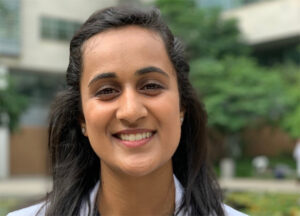 Nikita Sood, second-year student at the Washington University School of Medicine in St. Louis and the co-director of the student advocacy coalition LouHealth
Nikita Sood, second-year student at the Washington University School of Medicine in St. Louis and the co-director of the student advocacy coalition LouHealth
As a medical student, I took an oath to serve those in need and to “champion accessible, equitable, and sustainable care for all.” Part of this work means ensuring my future patients have access to the health insurance that helps them see their primary care physicians, receive preventative cancer screenings, and pay for the expensive, life-saving care they or their loved ones may need. For many of my future patients, Medicaid is that lifeline.
Sam* is a Burman refugee-turned-US citizen who lives in a loud, lively household in St Louis with his wife and two young children. He is also one of approximately 600,000 Missourians enrolled in Missouri Medicaid. He qualified for Medicaid only four years ago, after he was diagnosed with Neuro-Behçet’s Disease, a rare disorder in which the body’s own immune system attacks the blood vessels. For Sam, this led to inflammation in his brain that left him partially paralyzed in his left arm and leg. Now, as a disabled, low-income resident, Sam is able to get Medicaid.
At the time of his diagnosis, however, Sam did not have insurance. He had just started training at a new job when he began noticing signs of his illness; as a new employee, he did not yet qualify for insurance through his work. When Sam started to show stroke symptoms, however, he was concerned enough that he sought care anyway. The testing and treatment he received left him with thousands of dollars in out-of-pocket medical bills and, on top of that, his new disability meant he could not keep his job, the main source of income for his family of four.
Medicaid saved the life and the livelihood of Sam and his family. Without Medicaid, they would still be drowning in medical bills, four years after Sam first got sick. Without Medicaid, they would not be able to afford the lifesaving treatment Sam needs for his condition, including the $2500 shot he needs every two weeks. Had Sam not gotten so sick that he became physically disabled, he would still be without Medicaid.
Medicaid helps our most vulnerable community members, but, currently, it reaches far fewer people than it should. While Medicaid provides health insurance coverage to elderly, disabled, blind, and pregnant persons who meet the stringent income requirements, the vast majority of low-income adults are ineligible for coverage. Though Sam is able to get Medicaid due to his disability, Sam’s wife does not qualify. As a parent, if she makes at least $5,550 a year to support her family of four, she makes “too much money” to be eligible for Medicaid. This starkly contrasts the estimated cost of supporting the food, shelter, clothing, and other basic needs for a family of four in Missouri: $52,234 a year, almost ten times as much as the Medicaid threshold.
While $5,550 a year is “too much money” for Medicaid, it’s also “too little” to qualify for the federal marketplace subsidies that help Americans get health insurance outside of their workplace. This leaves a coverage gap that thousands of Americans—adults like Sam’s wife who work jobs that do not provide health insurance—fall into. For those with chronic health conditions like Sam’s Neuro-Behçet’s Disease, they may be left vulnerable to their condition until it disables them, too.
Currently, 564,000 Missourians lack health insurance. That means over half a million uninsured Missouri residents get less healthcare than their insured neighbors and that the care they do receive is less timely; experience worse health outcomes, including a higher risk of death; and are under a significantly greater financial burden.
On August 4, we as Missouri voters have an opportunity to remedy this injustice. By voting in favor of Amendment 2, we can help thousands of families like Sam’s that need our support—that need Medicaid. As a medical student, I will be at the polls advocating for the expansion of Medicaid, which will save the lives and livelihoods of my future patients. In reality, however, we all have a social responsibility to preserve the health of our communities—in this case it’s as easy as voting yes.
To learn more about Missouri Amendment 2, Medicaid Expansion Initiative, click here.
*Names have been changed to preserve anonymity. I would like to extend a special thank you to Sam, his family, and Kate Klimut for helping to share this story.